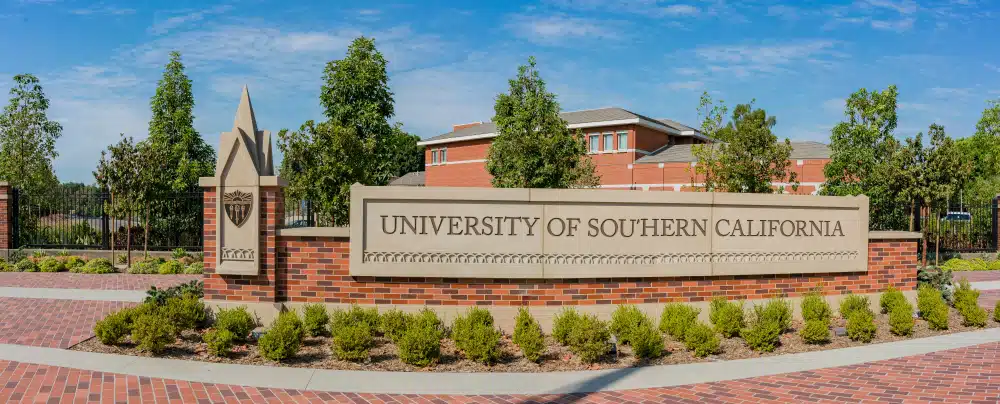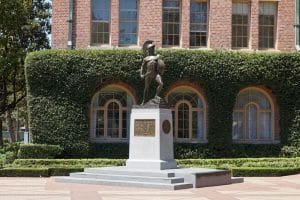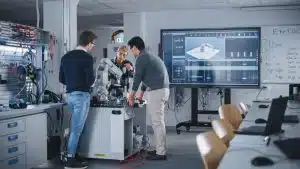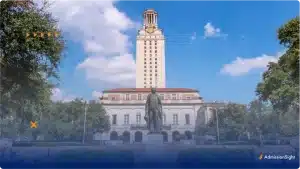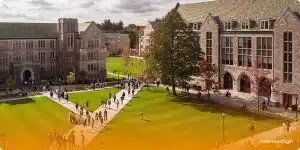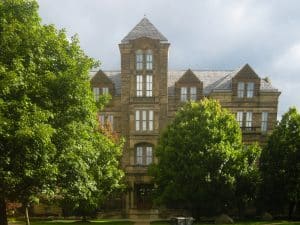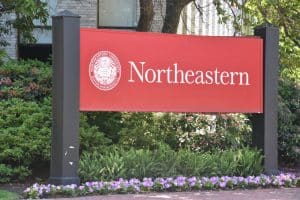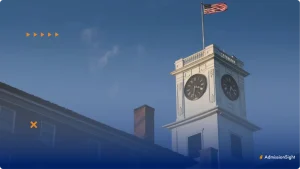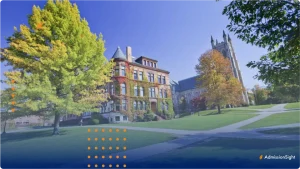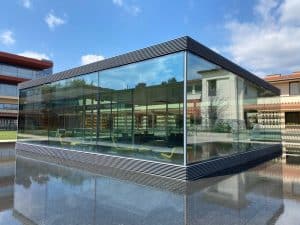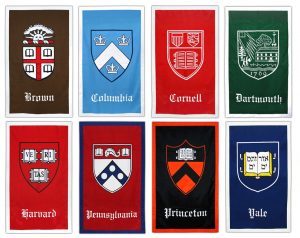Exploring the USC Curriculum
As one of the top universities in the United States, the University of Southern California (USC) offers a comprehensive and diverse range of educational opportunities for students. In this article, we will take a deep dive into the USC curriculum and its structure, the institution’s various faculties, the significance of general education, and the special programs and opportunities available to students.
Understanding the USC Education System
Understanding the USC education system involves recognizing that it goes beyond mere knowledge acquisition; it is dedicated to cultivating well-rounded individuals equipped with critical thinking, problem-solving, and communication skills. These essential qualities are rooted in the core principles that underpin the bedrock of learning at USC.
When it comes to education at USC, the university believes in providing students with more than just information. USC aims to cultivate individuals who can think critically and analytically, solve complex problems, and effectively communicate their ideas.
By focusing on these essential skills, USC prepares students for success in their future careers and equips them with the tools necessary to navigate an ever-changing world.
One of the core principles of USC education is interdisciplinary studies. This approach allows students to connect knowledge across different fields, promoting a holistic approach to problem-solving.
By exploring various disciplines, students gain a broader perspective and develop the ability to think outside the box. This interdisciplinary approach enhances their understanding of complex issues and encourages innovative thinking and creativity.
Active learning methodologies play a crucial role in the USC education system. Rather than passively absorbing information, students are encouraged to engage with the subject matter actively. This can take the form of group projects, discussions, and research. By actively participating in their education, students develop a deeper understanding of the material and are better equipped to apply their knowledge in real-world situations.
Furthermore, USC believes in the importance of hands-on experiences. The university provides numerous opportunities for students to gain practical experience through internships, research projects, and community engagement. These hands-on experiences allow students to apply their knowledge to real-world scenarios and help them develop essential skills such as problem-solving, teamwork, and adaptability.
While USC greatly emphasizes academic excellence, the university also recognizes the significance of ethical and moral values. USC encourages students to develop a strong sense of integrity and social responsibility. By instilling ethical values, USC aims to produce graduates who not only excel in their chosen fields but also make a positive impact on society.
The Structure of the USC Curriculum
The USC curriculum is designed to provide students with a comprehensive education that balances their major field of study with general education requirements. This structure ensures that students receive a well-rounded education and can explore diverse subjects.
The curriculum is divided into General Education, major, and elective courses. General Education courses cover foundational topics essential for all students, regardless of their major. These courses provide a broad knowledge base and help students develop critical thinking and communication skills.
Major courses focus on the specific field of study chosen by the student. These courses delve deeper into the subject matter and allow students to develop expertise in their chosen area. Whether it’s engineering, business, or the arts, USC offers a wide range of majors to cater to diverse interests and career aspirations.
In addition to General Education and major courses, students have the opportunity to take elective courses. These courses allow students to explore subjects outside of their major and pursue their personal interests. Electives provide flexibility in the curriculum and enable students to tailor their education to their unique goals and passions.
Overall, the structure of the USC curriculum ensures that students receive a well-rounded education that combines depth in their major field of study with a breadth of knowledge across various disciplines. This comprehensive approach prepares USC graduates to excel in their chosen careers and make meaningful contributions to society.
Diving into Different Faculties at USC
Discussing the diverse faculties at USC when exploring the USC curriculum is essential because it highlights the university’s comprehensive and multidisciplinary approach to education. Each faculty offers distinct programs and expertise, contributing to the richness of the curriculum.
This diversity allows students to pursue their passions and interests across various academic disciplines, encouraging them to explore and broaden their horizons. Let’s explore a few of USC’s prominent faculties.
USC Dornsife College of Letters, Arts and Sciences
USC Dornsife is the university’s largest and oldest academic school, offering a wide range of arts, humanities, social sciences, and natural sciences programs. With a rich history of intellectual exploration, it provides students with a diverse and dynamic educational experience.
At USC Dornsife, students can engage with renowned faculty members who are experts in their respective fields. The school encourages critical thinking, research, and creativity across disciplines, fostering a culture of intellectual curiosity and academic excellence.
Whether students are pursuing degrees in psychology, history, biology, or any of the numerous disciplines offered, they benefit from a wealth of resources, including state-of-the-art laboratories, research opportunities, and a variety of academic centers and institutes. These resources enable students to delve into complex issues, conduct meaningful research, and make a positive impact in their chosen fields.
Furthermore, USC Dornsife emphasizes global engagement and offers study abroad programs, internships, and research opportunities worldwide, allowing students to gain a global perspective and develop a deep understanding of the interconnectedness of the world.
The School of Cinematic Arts
USC’s School of Cinematic Arts is renowned for its innovative film, television, and interactive media programs. From producing, directing, and screenwriting to animation, gaming, and virtual reality, this faculty equips students with the skills and knowledge needed to thrive in the ever-evolving world of entertainment.
Students at the School of Cinematic Arts have access to state-of-the-art facilities, including sound stages, editing suites, and motion capture studios. They can work with industry professionals and collaborate with fellow students on creative projects. The faculty also organizes various film festivals and showcases, providing students a platform to exhibit their work and connect with industry insiders.
Furthermore, the School of Cinematic Arts offers a range of specialized programs, such as the Interactive Media & Games Division, which focuses on the intersection of technology and storytelling. Students in this division explore emerging fields like virtual reality, augmented reality, and interactive narrative design, preparing them for careers at the forefront of digital media.
The Viterbi School of Engineering
The Viterbi School of Engineering offers a wide range of cutting-edge programs across various disciplines. Whether students aspire to become civil engineers building sustainable infrastructure or computer scientists developing groundbreaking technologies, the Viterbi School provides a solid foundation for their ambitions.
With world-class faculty and state-of-the-art research facilities, the Viterbi School of Engineering fosters an environment of innovation and collaboration. Students can work on real-world projects, partnering with industry leaders and conducting groundbreaking research. The school also encourages entrepreneurship, offering resources and support for students interested in launching their own tech startups.
The Viterbi School covers a broad spectrum of disciplines, from aerospace engineering to biomedical engineering. Students can specialize in areas like robotics, artificial intelligence, renewable energy, and sustainable infrastructure.
With a focus on hands-on learning and practical application, graduates from the Viterbi School are well-prepared to tackle complex engineering challenges and positively impact society.
The Marshall School of Business
The Marshall School of Business prepares students for successful careers in the dynamic business world. With a focus on entrepreneurship, global business, and leadership development, students gain the skills needed to navigate the complexities of the modern economy and drive innovation.
At the Marshall School, students can access a wide range of resources and opportunities to enhance their business acumen. The faculty consists of accomplished business professionals who bring real-world experience into the classroom. Students can participate in internships, study abroad programs, and networking events to gain practical insights and build a strong professional network.
The Marshall School also offers specialized programs, such as the Lloyd Greif Center for Entrepreneurial Studies, which provides aspiring entrepreneurs with the knowledge and support to launch their own ventures. Students in this program learn about business planning, venture capital, and marketing strategies, preparing them to become successful entrepreneurs.
Additionally, the Marshall School of Business has strong connections with the business community, offering students opportunities for internships and mentorship. The school also hosts conferences and speaker series, inviting industry leaders to share their insights and experiences with students.
The Role of General Education
General Education forms an integral part of the USC curriculum, providing students with a breadth of knowledge across diverse disciplines. It serves as the foundation for holistic learning and equips students with essential skills that go beyond their major field of study.
When students embark on their academic journey at USC, they are introduced to the concept of general education, which plays a crucial role in shaping their intellectual growth. General Education is not just about fulfilling requirements; it is about expanding one’s horizons and developing a well-rounded perspective.
At USC, General Education courses challenge students to think critically, explore new subjects, and understand the world differently. It encourages students to step outside their comfort zones and embrace the unfamiliar. By doing so, students can develop a broader understanding of the complexities of the human experience.
The Purpose of General Education at USC
The role of General Education at USC is to expand students’ horizons, motivating them to explore subjects outside their comfort zone. It fosters critical thinking, effective communication, and an appreciation for the arts, humanities, social sciences, and natural sciences. By exposing students to various perspectives and modes of thinking, general education prepares them to adapt to new challenges and become well-informed global citizens.
Through General Education, students gain a deeper understanding of the interconnectedness of knowledge and the importance of interdisciplinary thinking. They learn to approach problems from multiple angles and appreciate the value of diverse viewpoints. This broad-based education equips students with the skills and knowledge necessary to navigate an ever-changing world.
Furthermore, General Education at USC encourages students to develop a sense of intellectual curiosity and a lifelong love of learning. It instills in them a desire to continue exploring new subjects and ideas even after they have completed their general education requirements. This commitment to lifelong learning is a valuable asset that will benefit students long after graduation.
The Breadth of General Education Courses
USC offers a wide selection of General Education courses, ensuring that students can explore their interests while fulfilling their requirements. Students can delve into diverse subjects, from literature and history to economics and psychology, and gain a broader understanding of the world.
The USC General Education program has ten requirements. Students must finish eight courses in six Core Literacies: The Arts, Humanistic Inquiry, Social Analysis, The Life Sciences, The Physical Sciences, and Quantitative Reasoning. Also, students must complete two courses in Global Perspectives, including one about Citizenship in a Global Era and one about Traditions and Historical Foundations. A Global Perspectives course can also count towards a Core Literacies requirement.
Through these courses, students are exposed to different ways of thinking and are encouraged to question assumptions and challenge conventional wisdom. They learn to analyze complex issues, evaluate evidence, and communicate their ideas effectively. The breadth of General Education courses at USC allows students to develop a well-rounded skill set that will serve them well in their future careers and personal lives.
Moreover, USC’s diverse range of general education courses reflects the university’s commitment to fostering a vibrant intellectual community. Students can engage in meaningful discussions with their peers and faculty members, creating a rich and dynamic learning environment. These interactions deepen students’ understanding of the course material and enhance their ability to collaborate and engage in constructive dialogue.
Within the USC curriculum, General Education plays a vital role in shaping students’ intellectual growth and preparing them for a complex and interconnected world. It provides students with the opportunity to explore new subjects, develop critical thinking skills, and become well-rounded individuals.
Through General Education courses, students are equipped with the knowledge and skills necessary to navigate the challenges of the 21st century and positively impact society.
Special Programs and Opportunities
In addition to a rigorous USC curriculum, the university offers special programs and opportunities that elevate students’ educational experiences and contribute to their personal and professional growth.
Honors Programs at USC
USC Dornsife’s Honors Programs offer dedicated students a chance to collaborate closely with professors and fellow high-achieving peers in advanced critical thinking, analysis, research, writing, and communication.
USC Dornsife majors have different requirements for earning departmental honors, but most ask for a minimum GPA and completion and defense of an honors thesis before graduation.
Past thesis topics include things like how people in a country react when military forces are sent abroad (International Relations), the connection between fashion and art (Art History), and how Game Theory can be used to understand online economies (Economics). Students can apply for these honors programs in their sophomore or junior year at USC Dornsife.
These programs are tailored to ignite intellectual curiosity and aim to offer a comprehensive, stimulating, and diverse educational journey.
Study Abroad Opportunities
USC offers extensive study abroad opportunities, spanning over 50 countries worldwide. These programs range from semester-long exchanges to intensive language courses, faculty-led excursions, and international internships. Students can earn academic credit while immersing themselves in diverse cultures and gaining global perspectives.
To be eligible for USC Dornsife’s study abroad programs, students must meet specific criteria and obtain approval from both USC Dornsife and the host institution. A minimum GPA of 3.0 is also required for semester- or year-long programs, although some programs have higher GPA requirements. Language proficiency is essential for language-intensive programs.
Furthermore, eligibility considerations encompass reviewing student conduct records, with violations potentially impacting eligibility. Some programs may also stipulate specific class standing requirements. It’s important to note that all study abroad courses must contribute to fulfilling undergraduate degree requirements.
Lastly, students are limited to participating in a maximum of two semester- or one-year-long program. This comprehensive approach ensures that students meet the academic and language prerequisites and maintain a satisfactory record of conduct, aligning their study abroad experiences with their academic goals and degree requirements.
USC’s well-established partnerships with institutions worldwide and dedicated support staff ensure a seamless transition and provide resources to maximize the educational and personal benefits of studying abroad.
Career Services and Internships at USC
Embedded within the USC curriculum is a strong commitment to empowering students for success in both their academic endeavors and future careers. The university collaborates with its Career Center to offer comprehensive career services and internships at USC.
Career Services at USC
USC’s Career Services is a dynamic resource that empowers students and alumni on their career journeys. Personalized guidance and a wide range of workshops help individuals develop essential skills, including resume building, interview preparation, and job search strategies.
USC’s extensive network and strong industry connections facilitate internship and job placements, ensuring students gain real-world experience in their chosen fields. Whether exploring career paths, seeking internships, or preparing for job interviews, USC’s Career Services is committed to helping individuals achieve their professional goals.
Internship Opportunities through USC
USC offers abundant internship opportunities that provide students with invaluable real-world experiences. With strong connections to various industries, the university helps students secure internships tailored to their career aspirations. These opportunities enhance academic learning and equip students with practical skills and insights.
USC’s commitment to experiential learning ensures that students can apply classroom knowledge in professional settings, preparing them for success in their chosen fields. These internships are a crucial part of the USC experience, fostering a seamless transition from academia to the workforce.
Exploring the USC curriculum reveals a diverse and enriching educational landscape that fosters academic excellence and personal growth. USC’s rigorous programs, world-class faculty, and vibrant campus community provide students with a transformative learning experience.
However, USC admissions is highly competitive, with many talented applicants vying for limited spots. This is where AdmissionSight comes into play. AdmissionSight’s expert guidance and personalized approach have assisted countless students in navigating the competitive admissions process at USC and other prestigious institutions.
With AdmissionSight’s support, aspiring students can increase their chances of securing a coveted spot at USC, making their academic dreams a reality and opening doors to a world of opportunity.



